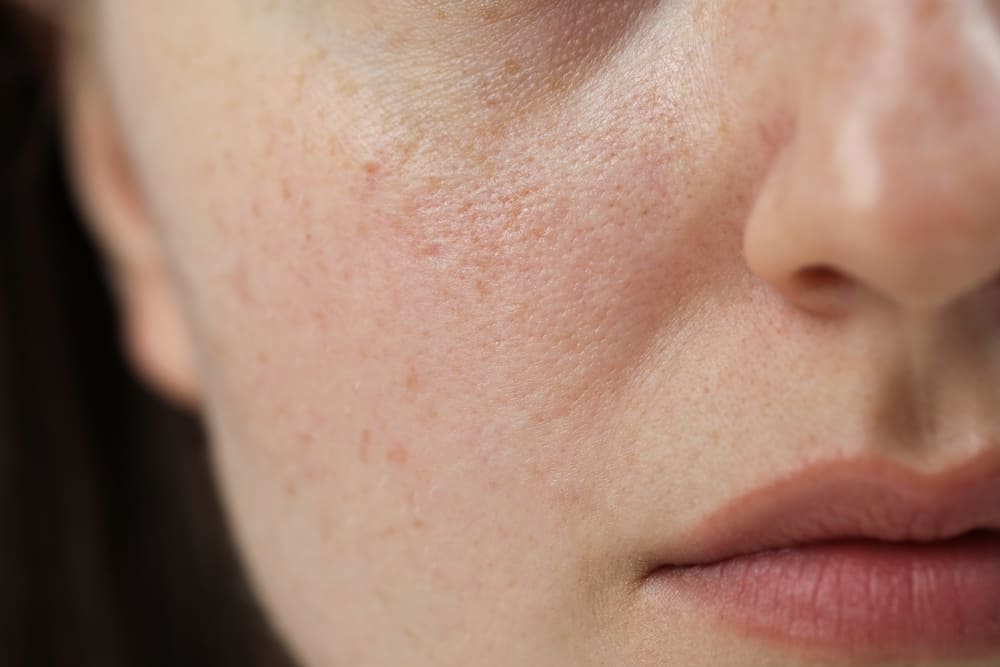Winter is a beautiful season, but it can be harsh on your skin. The cold, dry air outside and heated indoor environments can strip your skin of its natural moisture, leaving it dry, flaky, and uncomfortable.
Dry skin in winter is not just a cosmetic concern—it can lead to discomfort and, in severe cases, skin conditions like eczema or dermatitis. Understanding the reasons behind this seasonal dryness and learning how to combat it effectively can make all the difference.
With the help of right care and simple lifestyle changes, you can safeguard your dry skin in winter from harsh effects, ensuring it remains soft, smooth, and healthy. You can enjoy your winter without any concern of your skin.
What Are the Signs of Dry Skin?
Dry skin, medically known as xerosis, is a common skin condition due to lack of moisture in the skin’s outer layer. It is a temporary condition occurring in the winters, you may find your skin turning extremely dry even in other seasons.
Visible Symptoms
Dry skin in winter often presents visible indicators that are hard to miss, because its visible to others as well.
- Rough, Flaky, or Scaly Texture: The skin may appear uneven or feel rough to the touch. Flakiness, particularly on the cheeks, arms, or legs.
- Tightness: A tight or stretched sensation, especially after cleansing or bathing.
- Cracks: Severe dryness can cause small, visible cracks.its start bleeding sometime as well.
Sensory Signs
Dry skin often causes uncomfortable sensations beyond visible symptoms, impacting how your skin feels.
- Itching and Irritation: Dry skin often feels itchy, which can be uncomfortable and even lead to redness if scratched excessively
- Stinging or Burning: Especially common when the skin’s barrier is compromised, leading to heightened sensitivity.
- Redness: Dry skin can cause mild to moderate redness and irritation. This symptom is often seen on the face.

Complications
If you ignored, dry skin can lead to more severe concerns:
- Dermatitis: Chronic dryness may escalate to conditions like eczema or contact dermatitis, which require medical attention.
- Skin Infections: Cracked or broken skin increases the risk of bacterial or fungal infections.
- Accelerated Aging: Prolonged dryness can diminish elasticity, leading to fine lines and wrinkles.
These are some signs where you need to think about your dry skin.
What Causes Skin to Become Dry During Winter?
The following factors can contribute to the development of dry skin in the winter season:.
Low humidity:
Low humidity in winter means the air holds significantly less moisture than during warmer months. This lack of moisture causes your dry skin in winter to lose its natural hydration. Both outdoor cold air and heated indoor environments create drier conditions, stripping the skin of its essential oils, leaving dryness and irritation. The low humidity depletes the skin’s ability to retain moisture, leading to symptoms like roughness, tightness, and flakiness. You can protect your skin with the help of proper hydration and a strong moisturizer.
Indoor Heating Systems:
ndoor heating systems are important for comfort during winter, but they can have a negative impact on your skin. By warming the air, heaters significantly lower indoor humidity levels, creating an environment that lacks adequate moisture.
This dry atmosphere pulls hydration away from the skin, leaving it feeling tight, flaky, and irritated, the skin’s natural protective barrier, increasing susceptibility to dryness, redness, and even cracking. To minimize these effects, consider using a humidifier to restore moisture in the air and try to hydrate yourself.
Hot Showers and Baths
You may feel very comfortable and relaxed in the cold winter season but it’s not good for your skin. It can strip away the skin’s natural oils, making it drier and more prone to cracking.
It struggles to maintain a healthy balance of hydration, the skin is the largest organ, dehydration manifests visibly, making the skin appear dry, flaky, and less elastic.
Age and Skin Type
Age and skin type play a crucial role in determining how well your skin retains moisture. As we age or deal with specific skin conditions, the natural ability of the skin to hold moisture.
As people age, the production of natural oils, ceramides and Aging skin tends to lose collagen and elastin, leading to reduced elasticity and water retention capabilities.
People with naturally dry skin have fewer oil-producing glands, and skin more prone to dehydration, particularly in winter or dry climates, but Oily skin types may feel less dryness
How to Prevent Dry Skin in Winter?
Dry and uncomfortable skin can often feel like an unavoidable side effect of the cold season. With a few thoughtful changes to your routine and habits, you can effectively combat winter dryness and maintain a healthy glowy skin .
Use Gentle Skincare Products
To avoid dry skin in winter and keep your skin protected, switch to skincare products that are gentle and nourishing. Go for the cleansers, soaps, and lotions free from harsh chemicals, sulfates, and artificial fragrances, as they can strip the skin of its natural oils. Instead, choose products enriched with hydrating ingredients such as glycerin, ceramides, or essential oils. These will help replenish the moisture barrier, leaving your skin feeling soft and hydrated without causing irritation.
Avoid Long, Hot Showers
While hot showers may feel soothing during the chilly winter months, they can actually harm your skin. Hot water strips the skin of its natural oils, causing dehydration and making it prone to cracks and irritation. According to this article, hot showers can worsen skin dryness. Instead, lukewarm showers help preserve your skin’s moisture.
Layering for Protection
In winter, protecting your skin from the harsh, cold air is crucial, especially if you struggle with dry skin in winter. Layering your clothing can provide an effective shield from the drying elements. Wear gloves to protect your hands and scarves or high-neck sweaters to shield your face.
Ensure that your clothing consists of breathable fabrics like cotton or wool that retain heat ,Layering helps maintain body heat and provides an additional layer of defense, reducing exposure to the environment.
Hydration Is Key
During winter, the dry air can dehydrate your skin and it is one of the main cause of dry skin in winter, making it essential to stay hydrated. Drinking plenty of water throughout the day helps maintain moisture levels in the skin, ensuring it stays healthy and plump. In addition to water, consider adding warm beverages like herbal teas or coconut water to further support hydration. Hydrating foods, such as cucumber, watermelon, and oranges, also provide extra moisture and nutrients.

Eat for Your Skin
The foods you consume have a significant impact on your skin’s health during the winter. Eating healthy fats such as those found in avocados, nuts, and oily fish helps strengthen your skin’s barrier. Omega-3 fatty acids and Vitamin E-rich foods like salmon, walnuts, and seeds nourish etc.
Moisturiser for dry skin in winter

You have to try to moisturise your dry skin in winter. It is very important to control dryness and maintain a soft, healthy texture. The cold air outside and heated environments inside often lead to a loss of moisture, making your skin feel dry, tight, and sometimes itchy.
Moisturizing is essential to combat these effects. It replenishes the water content in your skin, keeps it soft and smooth, and creates a protective barrier against further environmental damage. Regular moisturizing helps restore the skin’s moisture balance.
Let, discuss how you can keep moisturise your skin in winter and glow all the season
Importance of Moisturizing
Moisturizing plays a crucial role in refilling the water lost from your skin due to the harsh winter weather. It helps maintain the skin’s natural hydration levels, providing a protective layer that prevents moisture loss. Moisturizers also soothe and heal dry patches.
Choosing the Best Moisturizer for Winter
A good moisturizer for dry skin in winter should contain hydrating agents like hyaluronic acid and glycerin to attract moisture, and shea butter or squalane to smooth the skin. It helps to lock hydration in skin , while ceramides and niacinamide repair the skin barrier. If it contains SPF 50, it also protects the skin from harmful UV rays.
Best Time to Apply Moisturizer
The best time to apply moisturizer is immediately after a shower or bath. During a shower, You need to reapply moisturizer throughout the day as per your body.
Moisturizer as per your skin type
- Dry Skin: Choose a thick, cream-based moisturizer with ceramides, hyaluronic acid, and shea butter.
- Oily Skin: Go for lightweight, gel-based moisturizers with non-comedogenic ingredients like glycerin and aloe vera.
- Sensitive Skin: Look for soothing moisturizers with ingredients like oat extract, chamomile, or niacinamide.
- Combination Skin: Pick a balanced moisturizer with water-based hydrating agents like hyaluronic acid.
By following this you can maintain moisture level in your skin as well body, for personalized suggestion you can book your free consultation by clicking below.
What to Eat for Healthy Skin in Winter?
What you eat plays an important role in maintaining healthy, hydrated skin during the winter months. Consuming a diet rich in skin-nourishing nutrients can help combat dryness and keep your skin glowing despite the harsh weather.
Here’s are some options you can eat in winter for better skin
Hydrating Foods
Winter’s cold air can strip your skin of moisture, making hydration from within essential. Foods high in water content, such as cucumbers, oranges, and citrus fruits like lemons and grapefruits, can help you to keep your skin hydrated. These hydrating foods also provide essential vitamins and antioxidants that promote health.
Fatty Acids for Skin Moisture
Avocados, nuts, and oily fish like salmon and mackerel are rich in omega-3 fatty acids, which play an important role in keeping your skin hydrated. These healthy fats nourish your skin from the inside, helping to preserve moisture and improve elasticity, leaving your skin looking supple and soft. Including these fatty acids in your diet also supports your skin’s natural barrier, which helps protect it from harsh dry skin in winter conditions.
Vitamins for Skin Health
Maintaining healthy skin requires essential vitamins. Vitamin E, found in foods like almonds and sunflower seeds, helps nourish the skin and provides antioxidant protection against free radical damage.
Vitamin C, found in citrus fruits, peppers, and strawberries, promotes collagen production, keeping skin firm and elastic. Zinc, present in seeds, legumes, and whole grains, is crucial for skin regeneration.
Oils for Dry Winter Skin
Using oils for skin care during the winter months can work wonders in combating dryness and keeping your skin nourished. Oils not only replenish moisture but also help create a barrier that locks hydration into your skin. Here’s a closer look at some of the best oils for dry winter skin and how to use them effectively:
- Coconut Oil
- Almond Oil
- Olive Oil
- Jojoba Oil
- Rosehip Oil
- Avocado Oil
- Argan Oil
- Grapeseed Oil
- Sesame Oil
- Sunflower Oil
How to Apply Oils to Skin?
To maximize the benefits of oils for dry winter skin, apply them in a way that ensures deep nourishment. First, warm the oil slightly by placing a small amount in your hands and rubbing them together. The warmth helps the oil penetrate the skin more effectively, enhancing its hydrating properties. Gently massage the warm oil into your skin in circular motions, focusing on areas that tend to be driest, like elbows, knees, and hands. For an extra treatment, apply a thicker layer of oil before bedtime to allow the nourishment.
Oils for Specific Skin Types
Different skin types require different oils to ensure both hydration and skin health:
- For Oily Skin: Lighter oils like grapeseed oil or argan oil are ideal,
- For Combination Skin: Oils like jojoba oil work well as they mimic the skin’s natural sebum, offering hydration where needed without overwhelming the oily areas.
- For Sensitive Skin: Choose gentle oils such as chamomile oil or rosehip oil, which are known for their calming and anti-inflammatory properties.
Note: Before using any skin oil, perform a patch test to avoid adverse reactions. Apply a small amount of oil on your inner arm or behind your ear and wait 24 hours. If no redness, irritation, or itching occurs, the oil is safe to use on your skin.
Best Products for Dry Skin in Winter
Winter can take a toll on your skin, leaving it dry, flaky, and uncomfortable. The right products can help you to restore moisture and keep your skin healthy.
Below are some of the best products to include in your skincare routine for combating dryness during winter:
Moisturizers: Thick, rich creams are the best choice for dry skin during winter. Products containing ingredients like ceramides, glycerin, and hyaluronic acid
glycerin. These ingredients cleanse the skin without removing the essential moisture.
Serums: For an added moisture enhanced , hydrating serums with hyaluronic acid or vitamin C can help to repair the skin’s water content
Oils: Dry skin can benefit from natural oils like jojoba oil, rosehip oil, or argan oil, which offer rich hydration and nourishment.
Humidifiers: Since dry indoor air contributes to skin dehydration, using a humidifier in your bedroom or living area can help restore moisture to the air, creating a more skin-friendly environment.
By following this skincare you can enjoy your winter without feeling any dryness.
When to See a Doctor for Dry Skin?

You may wonder when you need to see a doctor for dry skin
Let’s discuss about it :
Dryness:
After applying sufficient moisturiser and other skin care still you are facing dryness. It could indicate an underlying condition, such as eczema or psoriasis.
It can lead to bleeding or open sores, increasing the risk of infection. A dermatologist can provide stronger treatments or recommend a prescription cream.
Intense Itching or Burning:
Dry skin that causes uncontrollable itching, burning, or discomfort is a normal sign of dry skin but it goes unbearable or after doing everything possible think you’re facing the same, it could be a sign of a condition like contact dermatitis or an allergic reaction, eczema, or psoriasis. A doctor can help identify the cause and recommend appropriate treatments.
Severe Cracking or Bleeding
Cracks in the skin that lead to bleeding can increase the risk of infections. If the dryness has reached this stage, It’s time to immediately consult a dermatologist.
Rashes
If dryness is turned into redness, swelling, or rashes, you may be dealing with an inflammatory skin condition that requires prescription treatments. A doctor may prescribe an antibacterial ointment or another treatment to promote healing.
Diagnosing the Cause of Dry Skin
Visiting a Dermatologist
If your dry skin is not improving from self-care efforts, seeing a dermatologist is crucial. A professional diagnosis can uncover underlying causes such as eczema, psoriasis, or other skin conditions. A dermatologist will assess your medical history, environment, and current symptoms, allowing them to recommend specific treatments.
Allergy Tests
- In some cases, allergies can be the source of dry skin. Ingredients in skincare products, soaps, or even food may cause allergic reactions, triggering skin irritation.
They do some tests as per your requirement than prescribed for you.
Skin Analysis
To better understand the causes of dry skin, dermatologists may perform skin analyses. This may include hydration tests that measure moisture levels in your skin or biopsies to examine skin layers for underlying issues.
Conclusion
Winter can be a tough season for your skin, especially if you’re struggling with dry skin in winter but with the right care and attention, it’s possible to protect your skin and keep it soft, healthy, and hydrated. From choosing gentle, hydrating skincare products to some changes in your diet, small changes can make a big difference. Moisturizing regularly, using oils to provide extra nourishment, and maintaining a balanced diet rich in essential vitamins and fatty acids are all key to keeping your skin resilient against the dry, harsh winter elements.
If you find that your skin doesn’t improve despite your efforts, or if you experience severe dryness, cracking, or other uncomfortable symptoms, seeking professional advice from a dermatologist is important. With the right strategies in place, you can confidently enjoy winter without any discomfort of dry skin. Stay hydrated, protect your skin, and enjoy the season.
Frequently Asked Questions
-
Why does dry skin get worse in winter?
Winter conditions, such as cold temperatures, low humidity, and indoor heating, strip the skin of its natural moisture, making it dry and flaky. The skin also loses its ability to retain moisture during the winter due to the cold, dry air, etc.
-
Is it safe to use home remedies for dry skin in winter?
Yes, many natural home remedies, like coconut oil, honey, or milk, are effective in providing relief from dry skin, but please consult your skin consultant.
-
How often should I moisturize my skin during winter?
To effectively combat dryness, moisturize your skin at least twice a day but still it depends on your skin type & texture.
-
Can diet improve the appearance of my dry skin?
Absolutely. A diet rich in omega-3 fatty acids, vitamin E, and hydrating foods like cucumbers, avocados, and oranges can support the skin’s moisture retention, combat dryness, and promote a healthy glow.
-
Can a humidifier help my dry skin in winter?
Yes, a humidifier helps add moisture to the air and prevents your skin from drying out by maintaining a balanced level of humidity indoors.

